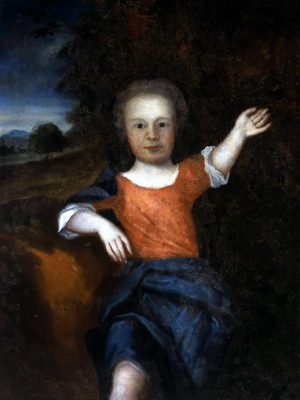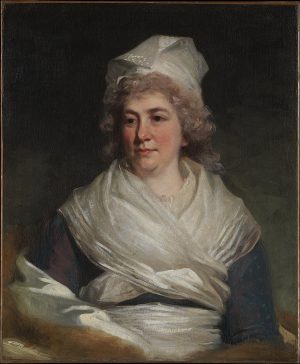Have you ever wondered what happened to the children of Benjamin Franklin? While it was a tragedy that his youngest son, Francis, died of a smallpox infection when he was only four years old, the rest of Franklin’s children went on to live long and prosperous lives. His son, William, was the last royal governor of New Jersey, and his daughter, Sarah, was a noted leader for women in the pro-independence movement in Philadelphia.
William Franklin
William Franklin (1730-1813) was the acknowledged illegitimate son of Benjamin Franklin, born before Benjamin’s common-law marriage with Deborah Read. His mother’s identity is unknown even until now because Benjamin was secretive about his birth. William was raised alongside his half-sister, Sarah.
When he was about 16 years old, William joined the provincial troops and served in the Albany expedition during King George’s War, earning the rank of captain in 1747, just a year later. In 1759, William went to London to study law at the Honourable Society of the Middle Temple (more commonly known as simply “Middle Temple”), leaving behind his fiancée, Elizabeth Graeme. Elizabeth was the daughter of prominent Philadelphia physician Dr. Thomas Graeme and step-granddaughter of Pennsylvania’s 14th Governor, Sir William Keith.
Engagement
Despite the disapproval of both families, William and Elizabeth discussed that the latter would wait for William’s return. However, there were some miscommunications and William thought the engagement was over while Elizabeth was still waiting for him. In the end, both parties ended up marrying other people. While in London, Franklin fathered an illegitimate son, William Temple Franklin, on February 22, 1762, then married Elizabeth Downes on September 4, 1762. Meanwhile, Elizabeth married Hugh Henry Fergusson in 1772.
American Revolutionary War Years
In 1763, William was appointed as the Royal Governor of New Jersey, replacing Josiah Hardy who sided with the legislature against the government. William was a Loyalist (or Tory) who believed in the divine right of kings and remained loyal to the British Crown during the American War of Independence. He was an Anglophile and a devout member of the Church of England, which only served to reinforce his Loyalist views. This caused a strain on his relationship with his father, who was a Patriot (or Whig) and believed in the right of Americans to self-government as well as a Founding Father of the United States.
He continued as governor of New Jersey and delivered his “Two Roads” speech to the New Jersey legislature on January 13, 1775, urging them to take a route to prosperity as part of England rather than rebel against the British Crown and cause civil war and anarchy. His speech did not go over well with the legislators, who were mostly Patriots. They unanimously voiced their support of the radicals in Boston. The American Revolutionary War (also known as the American War of Independence) began on April 19, 1775, and William was soon captured by the Patriots on January 1776. In response, William declared that he would not acknowledge the Provincial Congress of New Jersey, an entity that he considered an “illegal assembly.” He was later incarcerated for two years, in Wallingford and Middletown and then held in solitary confinement for eight months at Litchfield. In 1777, William’s wife Elizabeth died while he was still imprisoned.
In 1778, he was exchanged for John McKinley as a prisoner of war. McKinley was the rebel governor of Delaware who was taken by the British in New York. After William’s release in New York, he continued to work for the British and became the acknowledged leader of the American Loyalists. He set up military units to fight the Patriots as well as an unofficial yet active spy network. He also worked on propaganda to discourage desertion among British soldiers and Loyalist militiamen. While the Revolutionary War was raging on, his father sent him a letter saying he tried to understand William’s beliefs, but he could not forgive him for his actions.
Later Life
The Surrender at Yorktown in October 1781 effectively ended the war. The British surrendered and William departed to Britain with other Loyalists and never returned to America. In an attempt to reconcile with his father, William sent him a letter dated July 22, 1784, in which he wrote that their relationship “… till the commencement of the late troubles had been the pride and happiness of [his] life”. They saw each other one last time in 1785 when Benjamin dropped by Britain on his way back to the United States. When Benjamin died five years later, he did not leave anything for William in his will. Additionally, he stated that if Britain won the war, Benjamin would not have had any property left to give his son anyway. William settled in London and died there on November 17, 1813, at the age of 83.
Francis Folger Franklin
Francis Folger Franklin (1732-1736) was the second child of Benjamin Franklin and the first child of Benjamin Franklin and Deborah Read. He was born on October 20, 1732, in Philadelphia but only lived for four years until his death from smallpox on November 21, 1736. Like the rest of the family, he was buried in Christ Church Burial Ground.
He was supposed to be inoculated against smallpox, but the procedure was postponed due to an illness he contracted at the time. Francis’s parents were devastated by his death. As a result of this tragedy, Franklin became a major proponent of smallpox immunization.
Sarah Franklin
Sarah “Sally” Franklin (1743-1808) was the only daughter of Benjamin Franklin and Deborah Read. She was born on September 11, 1743, in Philadelphia, when her father was 37, and focused on his career. Growing up, Sarah did not have a very close relationship with her father as he was often away on business.
Early Life and Education
She was raised mainly by her mother and received the typical education for girls of her time and social class, which included reading, writing, arithmetic, spinning, knitting, and embroidery. She even learned French, likely from her father who was fluent in the language. Sarah was also a music lover and an accomplished harpsichordist.
Marriage and Children
At the age of 24, Sally married Richard Bache on October 29, 1767, while her father was still away. Franklin was displeased at first but warmed up to the idea after he met Bache in person. Bache was a merchant who was born in England but immigrated to New York and then to Philadelphia. However, Sally’s family, particularly her half-brother William, was not supportive of the match. They thought Bache was only after money and that the couple would always be dependent on them for financial assistance. Once married, they lived in the house of Sally’s parents and still stayed there even after Sally’s mother died of a stroke in 1774. Richard and Sarah had eight children together:
- Benjamin Franklin Bache (1769-1798)
- William Franklin Bache (1773-1814)
- Sarah Franklin Bache (1775-1776)
- Eliza Franklin Bache Harwood (1777-1820)
- Louis Franklin Bache (1779-1818)
- Deborah Franklin Bache Duane (1781-1863)
- Richard Franklin Bache (1784-1848)
- Sarah Franklin Bache Sergeant (1788-1863)
American Revolutionary War Years
During the Revolutionary War, Sally was an ardent Patriot like her father. She did extensive relief work for the suffering of both soldiers and civilians. After the death of her mother in 1774, she served as her father’s political hostess every time he returned from one of his diplomatic trips. In 1780, she even helped lead the Ladies Association of Philadelphia in making 2,200 shirts for soldiers in the Continental Army at Valley Forge.
While her father was away in France during the war, French politician François Barbé-Marbois wrote to him about Sally saying, “If there are in Europe any women who need a model of attachment to domestic duties and love for their country, Mrs. Bache may be pointed out to them.”
Later Life
After the war ended and Benjamin returned to Philadelphia, he lived together with Sally and her family until his death in 1790. He was very fond of his grandchildren, particularly Benjamin Franklin Bache, his namesake. Benjamin even took his young grandson to Europe with him in 1776. When he died, he left most of his estate to Sally and her husband. Four years later, the family moved to a farm outside Philadelphia.
On October 5, 1808, at the age of 65, Sally died from cancer and is buried in Christ Church Burial Ground in Philadelphia, alongside her parents. Her husband Richard outlived her for three years and died in Bucks County, Pennsylvania on April 17, 1811. He was also buried at Christ Church Burial Ground.


